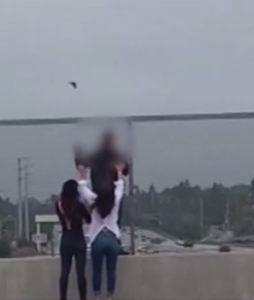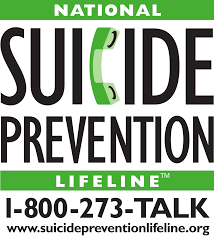There is a moving story in the news today, about a man who was so despondent that he was about to end his life by jumping off a bridge. Two women who noticed him made a u-turn, stopped their car and got out to talk him off the ledge. Literally.

I have just recently become a New Yorker. In my new home town, there are many human tragedies we walk by every day. The old man whose entire worldly possessions seem to be piled next to him on a public bench where he spent the night. Many others, whose bad fortune is obvious and highly visible, from whom we turn away. When it is clear that there is mental illness involved, we often move quickly past, trying to avoid eye contact. The two women who were driving along with their husbands when they noticed the man who appeared to be about to jump off the bridge, had recently watched the story of Kevin Hines, the man who survived a suicide attempt off the Golden Gate Bridge when he was 19 years old. Hines said he felt instant regret after he jumped and has now dedicated his life to suicide prevention. CNN Chief Medical Correspondent Dr. Sanjay Gupta recently profiled Hines as part of CNN’s “Champions For Change” series.
As a suicide expert and past NJ State Screener, I can attest to the fact that I have heard similar statements expressed by other people whom I have met during the course of my work in emergency psychiatric care. This is why it is so important to notice when someone is in distress, not to minimize the meaning of despondent statements as “just drama”, and to offer an ear, and encouragement to seek help. The next day can be better, even if it is hard to see it when engulfed in depression. It is important to be careful and self-protective, and not put oneself in harm’s way, which is why we avert our gaze and move along when someone on the streets of New York seems mentally ill. On a recent evening, passing by Times Square with my husband, someone accosted the passers-by, unprovoked, and as I went by, he yelled at me, “you, where are you from, you are not a New Yorker!” and I wonder if it was the fact that I do not avert my gaze, but as a mental health professional, immediately feel concern, which might have shown in my eyes. We have to be safe, yet someone’s small human gesture can make the difference between life and death.
I provide above the number to call and the link to the National Suicide Prevention Lifeline. If you or anyone you know seems to struggle with depression and might be at risk of harming themselves, please call.
Irit Felsen


Such an important, and balanced post! I particularly appreciate your attention to our conflicting wishes to help, and to keep ourselves safe.
As a member of your ongoing 2nd Gen discussion group, I am also in awe of your energy, psychic and otherwise, to attend to such a wide range of issues and needs.
Thank you so much. Your feedback nourishes my energy! I hope to see you in our Aug. 18 meeting.
Irit
These two women are truly Guardian Angels and role models to all of society. It would have been easy to drive away. But they chose to be there for a another human being who felt hopeless in the moment. I have always believed, if you see something, do something.
In a country that is currently so divided, I still believe that most people are good. Such acts of selflessness, restore my faith in humanity.
Thank you for your thoughtful comment. I agree wholeheartedly. Especially in these times, it is so important to focus on our mutual goals and mutual sense of belonging.
Irit